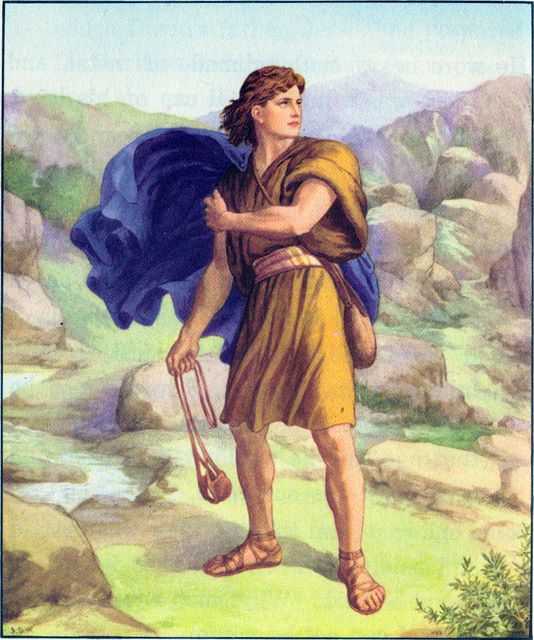
THE VALLEY OF ELAH.
THE morning sun had already bathed in ruddy light the mountain tops round Beit Nettif, and thrown their shadows far out across Philistia's plain, when mounting our horses, we began the deep descent, through terraced vineyards and olive groves, to
"the Valley of Elah." A long reach of the valley lay at our feet. It is about a quarter of a mile wide, with a rich alluvial bottom, and sides rising steeply, but not precipitously, to the height of five hundred feet or more. Through the center winds a torrent bed, now dry, but thickly covered with smooth white stones, and fringed with shrubs. On reaching the valley, we turned to the right and rode about a mile down it through cornfields. Then we saw on the left bank above us the gray ruins of Shocoh, and we knew that we now stood on the battle-field of David and Goliath.
"The Philistines gathered together their armies to battle, and were gathered together at Shocoh. . . . And Saul and the men of Israel were gathered together, and pitched by the Valley of Elah. and set the battle in array against the Philistines.
And the Philistines stood on the mountain on the one side, and Israel stood on a mountain on the other side, and there was a valley between them."
(1 Sam. 17:1.)
We saw the position of the two armies at a single glance. The Philistines were ranged along the side of the ridge at Shocoh, and the Israelites occupied the declivity opposite. Between them lay the valley then called Elah, from its "terebinth" trees; and now Sumpt, from its acacias." Down that left bank came Goliath, his brazen armor glittering in the sunbeams; down the opposite bank came David with his sling and staff. Reaching the torrent-bed, he selected "five smooth stones," and put them in his scrip. "Am I a dog," cried the haughty Philistine, looking at David's boyish face and simple equipments, " that thou comest to me with staves?" "I come to thee," replied the youth," in the name of the Lord of Hosts, the God of Israel, whom thou hast defied."
The stone was fixed; the sling was whirled round by a skillful hand; with a sharp twang the missile flew and pierced the brain of the impious giant. His own word did the rest. According to the custom of the time, David took the head and the spoils of his foe, and carried them back to his comrades. The Philistines fled in confusion; and the Israelites, raising a shout of triumph, hurried away in pursuit.
I too went down into that torrent-bed, as near as I could judge to the spot where David "chose the five smooth stones," and brought away "a smooth stone," which I still retain as a memorial of the battlefield, and of one of the happiest days of my life. Then turning from the Valley of if Elah, and from the border-land, I struck up the rugged path that leads over the mountains to Hebron; and thus ended my ride through the land of the Philistines, that ride, with another along a different route made at a later period, gave me a clearer understanding of some of the most interesting episodes in Scripture history than I could ever have obtained otherwise, the early intercourse of the patriarchs with the Philistine lords, the campaign of Joshua, the restoration of the ark, the romantic story of Samson, and the brilliant victory of David, became, when read on the scenes of action, glowing life pictures, nowhere else in all my wanderings through Bible lands did the harmony between the land and the Book appear more striking, more perfect, than in the plain of Philistia.
Porter.